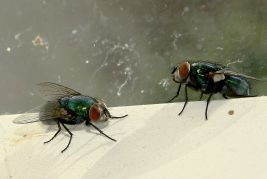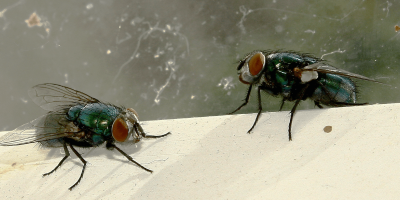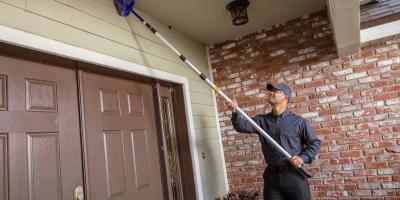Commercial Fly Control: Flies Commonly Found In Commercial And Business Settings

Many fly species are collectively referred to as “filth flies,” aptly named because of their affinity for potential contaminants like rotting food, waste, animal manure, and mold. Contact with these hazardous materials allows flies to inadvertently spread disease and mold to other surfaces, organisms, or food, which is especially detrimental to grocery and foodservice businesses. The first step in controlling a fly problem is identification.
- Common House Flies are the most common of all domestic flies. House flies can be found virtually anywhere in the world, and account for over 90% of all flies. A female house fly will typically lay around 500 eggs within its 30-day lifespan. A house fly can be identified by four lengthwise stripes on the thorax. House flies have been known to carry cholera, dysentery, typhoid, and even polio.
- Blow Flies — which include bottle flies and carrion flies — often appear as a shiny, metallic blue or green. They will feed on animal waste and can sense a food source within a radius of one mile. Blow flies have been known to spread cholera and numerous bacterial infections to humans.
- Phorid Flies are also occasionally called scuttle flies in reference to their preferred escape tactic of running across surfaces rather than taking flight. Phorid flies are easy to identify because of their humped backs. They tend to dwell around clogged drains, sewage, wet garbage receptacles, and food service or storage areas, especially if there are rotting materials present.
- Drain Flies have short, furry bodies similar to a moth. The water-repellent hairs on their exterior make them virtually impossible to drown, and they are more resistant to heat and chemical control methods compared to other species.
Regularly cleaning drains and removing unnecessary standing water is crucial for the extermination and control of this common pest. A common myth is that pouring bleach down drains will control drain flies: this is NOT an effective control method, and can actually cause damage to the pipes.
Have questions about keeping flies out of your business? Contact JP Pest Services today for a free fly control consultation. Our service professionals understand the specific requirements to keep New England businesses free from unwanted pests and are dedicated to solving your pest problems, including proper training for all your employees.



